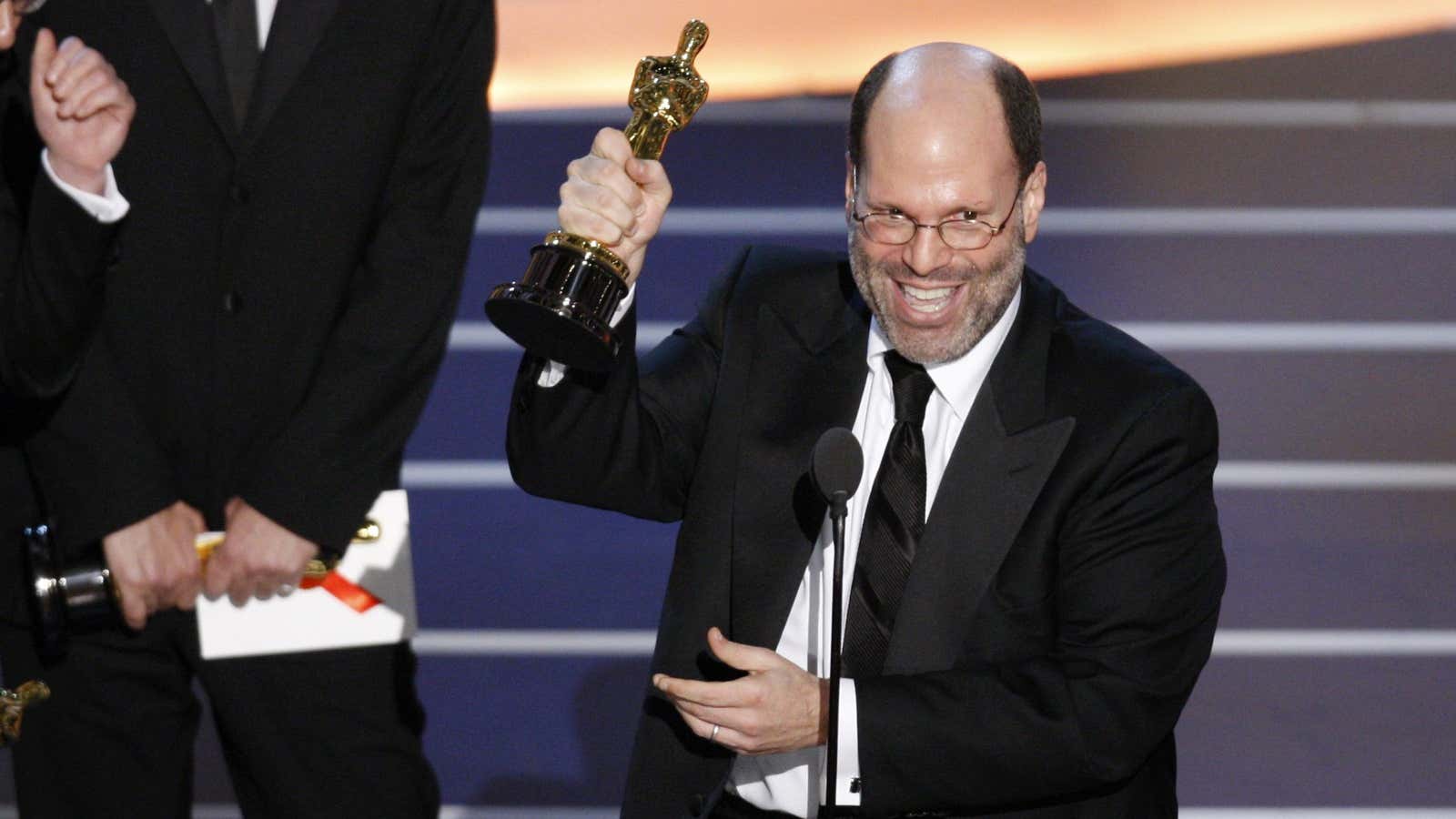Staplers. Glass bowls. A baked potato.
These are just some of the objects that Scott Rudin, a prolific film and theater producer, has been accused of throwing at or in the direction of his employees, part of a decades-long pattern of abuse alleged yesterday in the Hollywood Reporter.
A number of former employees at Rudin’s New York-based production company—many of them young assistants—relayed stories about the toxic and outright dangerous work environment. Rudin—producer of movies and Broadway shows as varied as No Country for Old Men, The Dictator and The Book of Mormon—allegedly smashed a computer monitor on an assistant’s hand for failing to book him a seat on a particular flight. Another employee left work in an ambulance after having a panic attack when Rudin shattered a glass bowl against the wall. Others recount instances of lying, manipulation, and intimidation in what amounts to psychological torture. “There was a casual disregard for human rights,” one staffer told the Hollywood Reporter.
Rudin’s alleged behavior has long been an open secret in the entertainment industry. The 1994 film Swimming with Sharks, about an abusive film executive played by Kevin Spacey (who has since been accused of sexual misconduct), was rumored to be inspired by Rudin’s tyranny. TV producer Robert King admitted that a sadistic character in the series Evil was inspired by Rudin, and that he personally knows people abused by him. A 2005 story in the Wall Street Journal titled “Boss-Zilla!” revealed Rudin churned through 119 different assistants over a five year period.
The producer’s long-overdue comeuppance shines a light on the everyday abuse in Hollywood that’s often ignored as a result of the industry’s uniquely dehumanizing workplace culture. A noxious cocktail of factors—including a lack of diversity in leadership, a deeply warped power structure that exploits desperate workers, and a vain, ego-driven competitive landscape—allows the entertainment industry to continue to get away with all forms of abuse. That’s true even after the allegations against Harvey Weinstein sparked the #MeToo movement and helped weed out some of its worst offenders.
No diversity at the top
As is the case in many industries, white men dominate the leadership roles in Hollywood. But they dominate them to an even greater degree in entertainment than they do pretty much anywhere else. A recent report from McKinsey found that 92% of top-level film executives are white—more than any other industry surveyed. (Healthcare executives, by comparison, are 82% white). It also found that 80% of film executives are male.
Other surveys have reached similar conclusions. Though race, gender, and sexual orientation representation are improving (albeit slowly) on the screen, they are not making the same progress in boardrooms and corner offices. Hollywood is unlikely to change its abusive culture until it actually starts hiring more women bosses. Studies show men are more likely to commit bullying in the workplace, while women are more likely to be bullied. Men, of course, also commit statistically more crimes—violent ones and otherwise—than women.
Little accountability for those in charge
In some industries, there are boards and other forms of oversight to keep those wielding power in line. But due to the nature of the entertainment industry, many abusive executives answer to no one.
Human resource departments—when they exist at all—often attempt to sweep allegations of abuse under the rug, or deal with them internally, in order to protect the company. (The HR department at Harvey Weinstein’s company, for instance, failed to protect its employees). Rudin made employees sign non-disparagement agreements, according to the Hollywood Reporter, and quietly settled claims of bullying against him.
Many film, TV, and theater workers are freelancers who don’t have HR departments to turn to. Some are in unions, but the structure of power in major entertainment industries disincentivizes speaking out against managers. Everyone is replaceable, including the talent. Despite having power of their own, famous actors are often loath to use it against executives like Rudin because they are the ones ultimately casting films and getting projects funded and produced. All entertainment workers have someone to fear—except executives.
Getting bullied as a rite of passage
Perhaps the one thing that sets the entertainment industry apart from others is its perverse system of advancement. Virtually all who progress into more prominent roles will have had to withstand some type of mistreatment to get there. In fact, young Hollywood hopefuls with dreams of succeeding in Los Angeles or New York are often prepared for that inevitability—a fact executives exploit.
“In Hollywood, bullying is condoned as part of ‘paying your dues’ on the way up and has been openly displayed in films like 1994’s Swimming with Sharks and 2019’s The Assistant,” Anita Hill, chair of the Hollywood Commission, a group working to make the industry more inclusive and equitable, wrote in a report last year examining abusive behavior in the entertainment industry. In a survey of nearly 10,000 entertainment workers, the Commission found that employees under 40 were far more likely to report abuse, and women were twice as likely to experience abuse “often or very often” as men.
That toxic culture has long been written off as “just show business” in an industry that enables massive egos and makes decision-makers believe they are more important than they are. It preys on desperate young workers, dehumanizing them and leading to even more forms of abuse. The Hill-led Commission suggested bystander intervention training and platforms to anonymously submit claims of bullying as two ways to combat the rampant abuse.
Unlike Harvey Weinstein, whose downfall came when it did because his power was already fading, Rudin is still a highly influential figure in Hollywood. He’s currently producing several films and plays with big-name actors attached, hoping to add to his collection of Oscars and Tonys. That former workers are speaking out now, while he’s still in power, suggests the industry is beginning to confront the twisted culture at the root of its many abuses once and for all.
